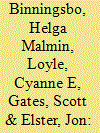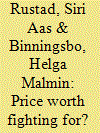|
|
|
Sort Order |
|
|
|
Items / Page
|
|
|
|
|
|
|
| Srl | Item |
| 1 |
ID:
117597


|
|
|
|
|
| Publication |
2012.
|
| Summary/Abstract |
This article introduces a new dataset on post-conflict justice (PCJ) that provides an overview of if, where, and how post-conflict countries address the wrongdoings committed in association with previous armed conflict. Motivated by the literature on post-conflict peacebuilding, we study justice processes during post-conflict transitions. We examine: which countries choose to implement PCJ; where PCJ is implemented; and which measures are taken in post-conflict societies to address past abuse. Featuring justice and accountability processes, our dataset focuses solely on possible options to address wrongdoings that are implemented following and relating to a given armed conflict. These data allow scholars to address hypotheses regarding justice following war and the effect that these institutions have on transitions to peace. This new dataset includes all extrasystemic, internationalized internal, and internal armed conflicts from 1946 to 2006, with at least 25 annual battle-related deaths as coded by the UCDP/PRIO Armed Conflict Dataset. The post-conflict justice (PCJ) efforts included are: trials, truth commissions, reparations, amnesties, purges, and exiles. By building upon the UCDP/PRIO Armed Conflict Dataset, scholars interested in PCJ can include variables regarding the nature of the conflict itself to test how PCJ arrangements work in different environments in order to better address the relationships between justice, truth, and peace in the post-conflict period.
|
|
|
|
|
|
|
|
|
|
|
|
|
|
|
|
| 2 |
ID:
117017


|
|
|
|
|
| Publication |
2012.
|
| Summary/Abstract |
While a number of publications show that natural resources are associated with internal armed conflict, surprisingly little research looks at how natural resources affect post-conflict peace. This article therefore investigates the relationship between natural resources and post-conflict peace by analyzing new data on natural resource conflicts. We argue that the effect of natural resources on peace depends on how a country's natural resources can constitute a motive or opportunity for armed conflict. In particular, three mechanisms may link natural resources to conflict recurrence: disagreements over natural resource distribution may motivate rebellion; using natural resources as a funding source creates an opportunity for conflict; and natural resources may aggravate existing conflict, acting either as motivation or opportunity for rebellion, but through other mechanisms than distributional claims or funding. Our data code all internal armed conflicts between 1946 and 2006 according to the presence of these resource-conflict links. We claim such mechanisms increase the risk of conflict recurrence because access to natural resources is an especially valuable prize worth fighting for. We test our hypotheses using a piecewise exponential survival model and find that, bivariately, armed conflicts with any of these resource-conflict mechanisms are more likely to resume than non-resource conflicts. A multivariate analysis distinguishing between the three mechanisms reveals that this relationship is significant only for conflicts motivated by natural resource distribution issues. These findings are important for researchers and policymakers interested in overcoming the 'curse' associated with natural resources and suggest that the way forward lies in natural resource management policies carefully designed to address the specific resource-conflict links.
|
|
|
|
|
|
|
|
|
|
|
|
|
|
|
|
|
|
|
|
|